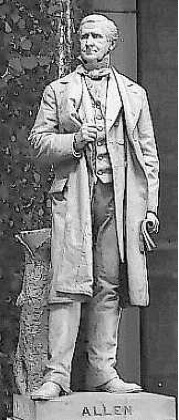
Bill Allen had a long political career in Ohio spanning the ante-bellum and the post-Civil War periods. He was a man of striking personal appearance and an effective, fluent speaker with a voice like a foghorn. He was a Jacksonian Democrat of unquestioned integrity.
At the age of 71, he became Ohio’s 31st governor by beating the incumbent by only 817 votes. “Old Bill Allen” took his duties seriously and by nine-thirty each morning was in his executive offices. He examined every document carefully before it received his signature. In his messages to the State legislature he stressed the need for economy, lower taxes, and the enforcement of Ohio’s laws. Governor Allen’s conservative, economical administration attracted national attention. By acclamation the Democrats again nominated Allen for re-election in 1876. However, there was dissension within the Democratic ranks, and the Republican’s candidate for governor, Rutherford B. Hayes, defeated William Allen. Old Bill then retired to private life, and on July 11, 1879, he died at his home, Fruit Hill, located near Chillicothe. He is buried there along side his wife, Effie, who he had married in 1842.
Governor William Allen’s Quaker ancestors settled in Pennsylvania. The town of Allentown was named after another William Allen. His father, Nathaniel, was an officer in the Revolutionary War and later a member of the North Carolina convention which ratified the federal constitution. Shortly after William’s birth in 1803, both his parents died. Due to a technicality of the law, he was deprived of his share of the large estate of his father. At the age of sixteen, Allen made the perilous journey on foot across the Alleghenies to his sister’s home in Chillicothe, Ohio. There he studied law and was admitted to the bar. In 1832 Allen was nominated for representative to congress by the Jacksonian Democrats. After an exciting campaign, Allen won by a single vote over former Governor Duncan McArthur, who became Allen’s father-in-law 10 years later.
In 1837 Allen was elected to the U.S. Senate where he acquired a reputation as an ardent expansionist. He urged the annexation of Texas and was one of the vociferous advocates in the Oregon controversy with Great Britain. He is credited with coining the slogan of “Fifty-four Forty or Fight.” During the Civil War, Bill Allen was a Peace Democrat and a bitter critic of the Lincoln Administration. The Ohio Democrats had a wonderful opportunity to regain control of the governor’s office during the Republican maladministration of Ulysses S. Grant, provided they could find a suitable candidate. They need an old-time Democrat who stood high in the party and a man whose honesty was beyond reproach. Their first choice was “Old Bill” Allen who was elected in 1874.
